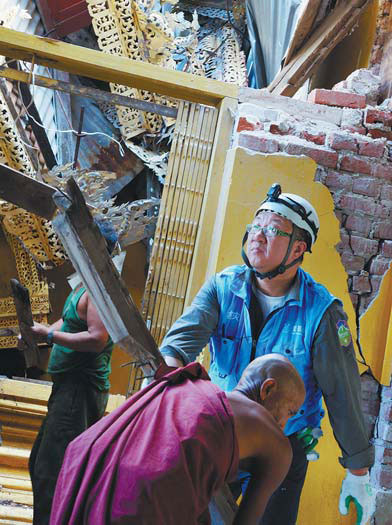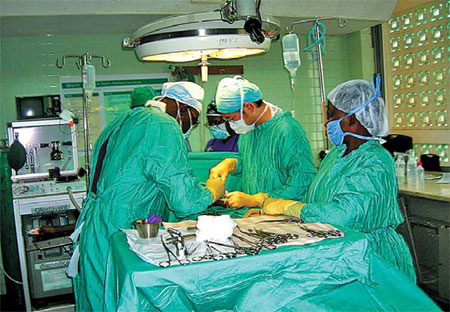Volunteers are on the frontline of a new world
Updated: 2012-12-05 08:18
By He Na and Peng Yining (China Daily)
|
|||||||||
|
Volunteer Lu Hongzhong joins relief work after a severe earthquake in Myanmar in November. Provided to China Daily |
|
A Chinese volunteer performs surgery on a patient in Liberia. Provided to China Daily |
Improving living conditions overseas is work that brings its own rewards, report He Na and Peng Yining.
While most of Liu Zelin's classmates are preparing their theses and searching for jobs, the 24-year-old is experiencing a radically different life in a country far from home.
Liu spends all his free time preparing teaching materials to use during the Chinese classes he gives every day as a volunteer in Uganda.
"With the growth of economic and cultural exchanges between China and Uganda during recent years, the country has seen a rise in demand for Chinese teachers," said the economics major at Guizhou University of Finance and Economics.
Team leader Liu and his 14 fellow volunteers arrived in the East African state in October and will work there for 12 months, teaching Mandarin and Chinese culture.
Although the work is unpaid, the Chinese government provides living expenses of 200 yuan ($32) a month.
Liu's workload at a middle school in Kampala, Uganda's capital, is heavy and he teaches almost every day. He usually rises at 6 am to make sure he's ready for classes when they start at 7:20 am.
"I enjoy the moment when the students meet us on campus in the morning. When they say hello and talk to us in Mandarin, I feel very proud and it puts me in a good mood at the start of the day," said Liu.
An increasing number of Chinese volunteers have joined overseas missions in recent years.
Since the first five Chinese volunteers traveled to Laos in 2002, nearly 600 have been dispatched to 22 countries in Africa, Asia and Latin America, according to the Youth Volunteer Work Department of the Communist Youth League of China Central Committee.
"To ensure the best quality, we make high demands on our volunteers and have established a series of strict tests and talent-selection procedures," said Guo Meijian, director of the Youth Volunteer Work Department.
In accordance with the requirements of the recipient countries, the volunteer programs have expanded from language teaching and cultural promotion to embrace a deeper level of training in technological and practical skills.
"The volunteers are all professionals in areas the countries urgently need. They not only contribute to the socio-economic development of recipient countries, but also make a solid contribution to cooperation and friendship and diplomacy," added Guo.
"Our volunteers in Ethiopia helped local farmers to improve their melon-planting methods and have been rewarded by seeing the bumper harvests that followed. They also taught the locals how to build and use the biogas pools that now supply all the household-energy needs. All of this has helped to boost local incomes," said Guo.
Chinese volunteers also helped solve a major problem for farmers in Liberia low rice yields. After a series of tests and investigations, the volunteers identified problems with local methods of planting and breeding the crop. Their suggested improvements, including raising the breeding temperature, have seen yields increase, he added.
Cultural ambassadors
Last year, Wang Bingxi, a law student at Jilin University, spent six weeks teaching Chinese in Kiev in Ukraine. She worked for AIESEC, or the Association Internationale des Etudiants en Sciences Economiques et Commerciales, one of the world's largest student-run organizations.
Wang found that local people had little idea of China's growing wealth and power. "To my surprise, I found that the local people's impressions of China were rooted in the 1960s or 70s," she said.
"In their minds, China is still a poor country with food shortages, and there are no high-rise buildings in the cities. Instead, they believed that everybody lives in bungalows," she said
"They were really surprised when they heard my comments about modern China. Many people expressed interest and several said they'd like to visit China if they get the opportunity. Sometimes I felt like a cultural ambassador to Ukraine, but the volunteer work was really meaningful," Wang said.
The ever-increasing number of Chinese volunteers serving overseas has drawn the attention of several international organizations, said Guo.
"A number of international voluntary organizations have contacted us to request cooperation. Both the United Nations Volunteers and Voluntary Service Overseas from the UK have asked that we recruit volunteers for them, to join their programs in Africa," he added.
In addition to government-sponsored volunteer programs, an increasing number of NGOs and grassroots organizations are also providing volunteers for overseas service.
The number of AIESEC volunteers recruited in China and working overseas has increased sharply in recent years, said Wang Lu, vice-president of outgoing exchange at the Global Community Development Program of AIESEC's Chinese operations.
The number of volunteers dispatched overseas has increased annually by 200 to 300 since 2002, according to Wang. So far this year, AIESEC has dispatched 2,000 volunteers to 50 countries. They work in education, poverty relief and programs related to human rights protection.
International rescue
In November, five Chinese volunteers traveled to Myanmar and became the first and the only foreign rescue team to visit the country in the wake of a 6.8-magnitude earthquake.
The team, funded by the One Foundation charity, spent six days in Myanmar, helping local people to evaluate their losses and putting forward suggestions on rebuilding collapsed temples and schools.
"Five people couldn't really do that much in six days," said Jiang Yili, the team leader. "But we sent aid and comfort from the Chinese people and are now working on a plan to rebuild some of the schools."
However, the procedures for voluntary work overseas can be long and complex, according to Jiang. "If we applied for formal permission to travel to Myanmar, it could take months and we could even be refused permission. So we applied for tourist visas instead."
Money is another problem. The six-day visit cost the One Foundation more than 100,000 yuan in total.
Jiang said that non-governmental volunteers lack experience of working overseas and the logistics involved.
It soon became apparent that the damage caused by the Myanmar quake was much less serious than had been anticipated, mainly because it struck in an area of low population density.
"But we didn't know that, so we invested more people and resources than the action really needed," said Jiang. "After all, it was our first mission. I hope we'll be able to learn more from Western organizations in the future."
Compared with other countries, non-governmental Chinese volunteer organizations still face challenges in the recruitment and organization of members. "We urgently need to improve the mechanism as soon as possible," said AIESEC's Wang Lu.
Gradual expansion
Guo Meijian said the country should expand its overseas voluntary work gradually.
"Voluntary service overseas covers many topics, such as economics, diplomacy, culture and society, so it's necessary to incorporate this work into a national diplomacy plan and gradually expand the scale of service and dispatch," he said.
Funding is the lifeblood of overseas voluntary work and a number of countries, including the United States and Japan, have established a special fund to guarantee those services, according to Guo.
"We have advised that the funding of China's overseas voluntary services should be incorporated into the Commerce Ministry's foreign aid budget," he said.
There is a high demand for volunteers with language skills and professional training and experience. However, while volunteers from developed economies usually undergo a month of training, that isn't the case in China, according to Guo.
"Limited funding means that our volunteers can only receive about one week's training, which reduces the quality of the support we can provide. An increase in training input is urgently needed if we're going to make real progress," he said.
Contact the reporters at hena@chinadaily.com.cn and pengyining@chinadaily.com.cn
(China Daily 12/05/2012 page6)

 Relief reaches isolated village
Relief reaches isolated village
 Rainfall poses new threats to quake-hit region
Rainfall poses new threats to quake-hit region
 Funerals begin for Boston bombing victims
Funerals begin for Boston bombing victims
 Quake takeaway from China's Air Force
Quake takeaway from China's Air Force
 Obama celebrates young inventors at science fair
Obama celebrates young inventors at science fair
 Earth Day marked around the world
Earth Day marked around the world
 Volunteer team helping students find sense of normalcy
Volunteer team helping students find sense of normalcy
 Ethnic groups quick to join rescue efforts
Ethnic groups quick to join rescue efforts
Most Viewed
Editor's Picks

|

|

|

|

|

|
Today's Top News
Health new priority for quake zone
Xi meets US top military officer
Japan's boats driven out of Diaoyu
China mulls online shopping legislation
Bird flu death toll rises to 22
Putin appoints new ambassador to China
Japanese ships blocked from Diaoyu Islands
Inspired by Guan, more Chinese pick up golf
US Weekly

|

|









